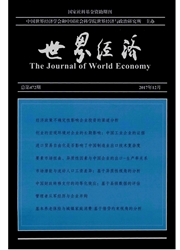

 中文摘要:
中文摘要:
本文从经济逻辑揭示,地区性别失衡对企业劳动收入份额有负向影响,其影响机制是性别比失衡会导致本地竞争性储蓄增加进而增加企业资本集约度,在资本一劳动存在替代关系下,性别比失衡会降低企业劳动收入份额。基于中国2000年人口普查和2005—2007年工业企业调查数据的经验证据支持了上述论点:地区性别失衡显著降低了所在地微观企业劳动收入份额,即便控制婚姻流动、少数民族样本以及婚前年龄区间不同划分等因素后,结论依然稳健;企业资本集约度的确在地区性别比和企业劳动收入份额之间发挥了中介效应。此外,不同投资来源的企业,因其对本地金融市场的依赖程度不同,其劳动收入份额受地区性别比的影响也存在差异。
 英文摘要:
英文摘要:
This paper shows that the impact of the sex ratio imbalance on the labor share of in- come for enterprises is negative through a theoretical framework. The influencing mechanism is that the sex ratio imbalance would increase the capital intensity of enterprises, which would decrease the labor share of income when the elasticity of substitution between capital and labor is above one. Using the 2000 census and 2005-2007 industrial enterprises data of china, the empirical results support our argu- ment that the gender imbalance would lead to a decline of labor share of income for micro-enterprises. The conclusion is still reliable even after controlling marriage flow, minority sample, premarital age range etc. In addition, we find that the capital intensity of enterprises is a mediator which carries the influence of the sex ratio imbalance on the labor share of income for enterprises. Furthermore, the effect of the sex ratio im- balance on the labor share of income differs among enterprises with different investment sources. The reason behind this is that different types of enterprises have various degrees of dependency on the local financial market.
 同期刊论文项目
同期刊论文项目
 同项目期刊论文
同项目期刊论文
 期刊信息
期刊信息
